May 01, 2024
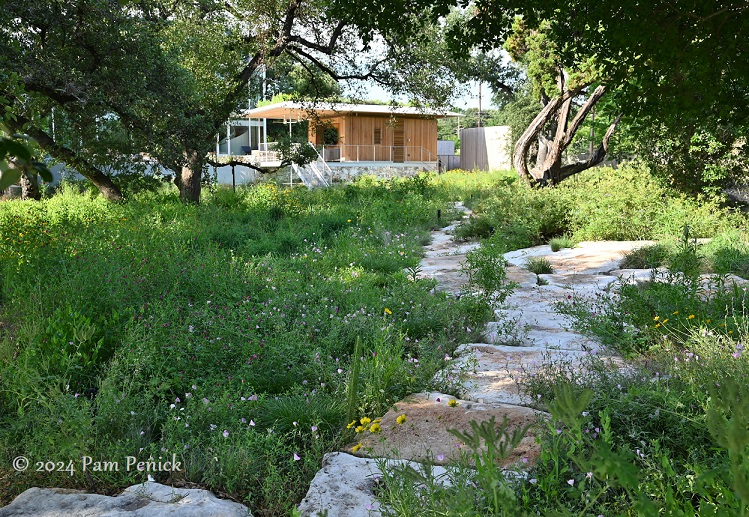
You wouldn’t expect to find a huge prairie garden here — the backyard of a private home so close to downtown Austin that blue-glass skyscrapers peek over the treetops. Owner Colin Corgan bought a historic 1880s house in the Travis Heights neighborhood a few years ago and embarked on a transformation of both the house and the property, a transformation that respects the history of each.
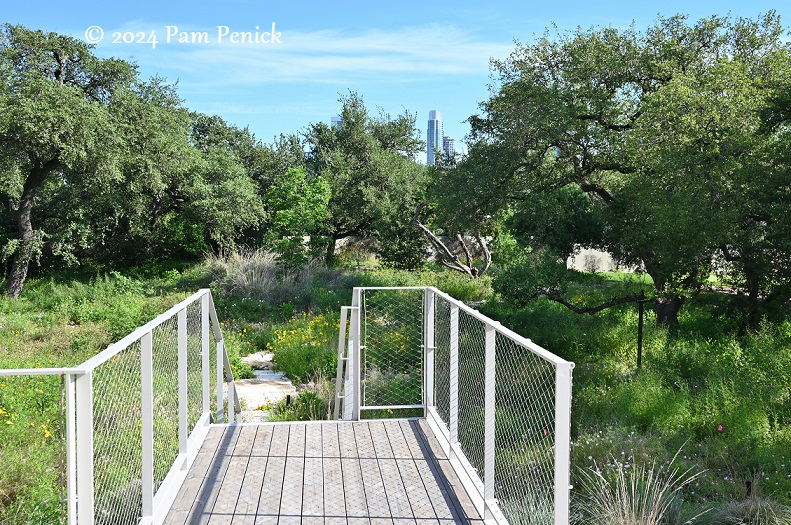
He restored the old Victorian home, retaining its connection with the past, while adding onto the back a contemporary, glass-walled annex that embraces light and outdoor views. Even before construction was finished, Colin turned his attention to the 1.3-acre lot, which occupies an entire city block. In place of a jungle of weeds and invasive trees that had colonized the property over the decades, he envisioned a native prairie garden flowing around existing live oaks.
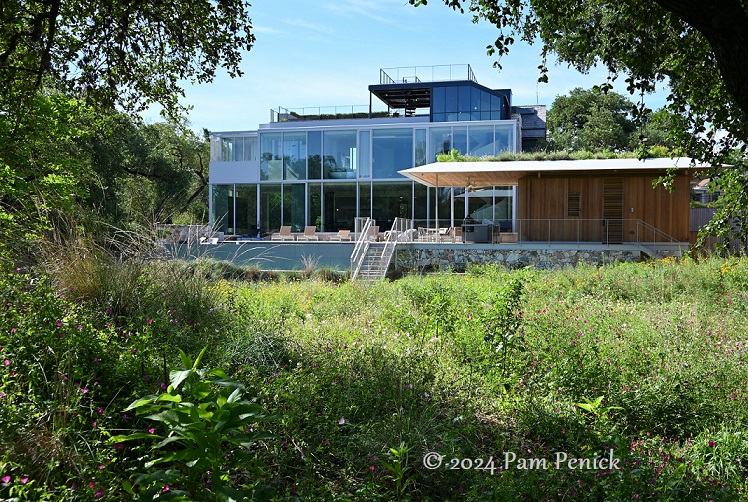
Colin brought in prairie-restoration expert John Hart Asher of Blackland Collaborative to prepare the soil and establish a native prairie garden and a green-roof meadow atop the pool house. (Other parts of the garden were designed by Shaney Clemmons of Shademaker Studio.) John Hart gave me a tour of the garden last week.
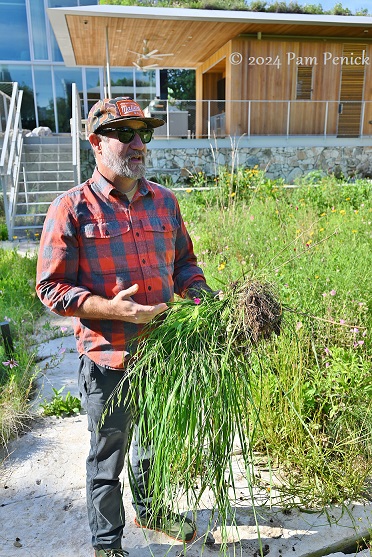
As John Hart yanked up an invasive bromegrass (Bromus catharticus), he told me that the prairie is becoming well established in its second year. Maintenance includes cutting it back hard once a year in February, before it breaks winter dormancy. Otherwise, he prefers to vary the maintenance schedule of a prairie to keep from accidentally creating conditions for just a few species to dominate. “Maintenance is a time for evaluation,” he says. “The strength of a prairie is the interactivity of it.”
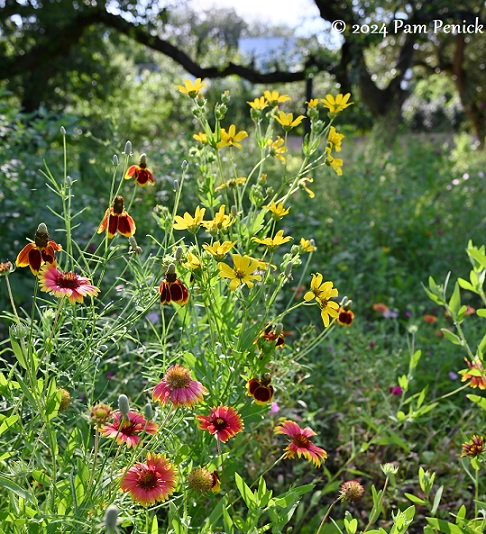
As with any garden, weeding is critical. Woody plants especially threaten a prairie garden, John Hart warns, because they shade out sun-loving annuals and perennials. To pull woody plants with deep taproots, he recommends using a weed wrench.
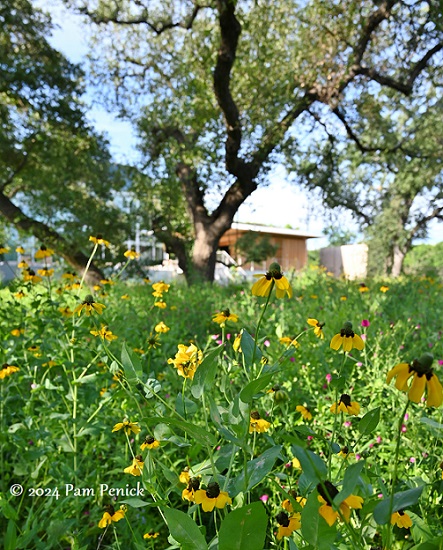
Later I asked Colin, who spoke with me by phone, why he wanted a native prairie garden. “Because this is what was here,” he replied. “For me, it’s not just the plants. It’s the ecosystem. Since planting this, there are more birds and lizards. They know it’s here. It takes time for that to happen. And it’s beautiful. I derive joy when I’m out there. It’s appropriate for this environment.”
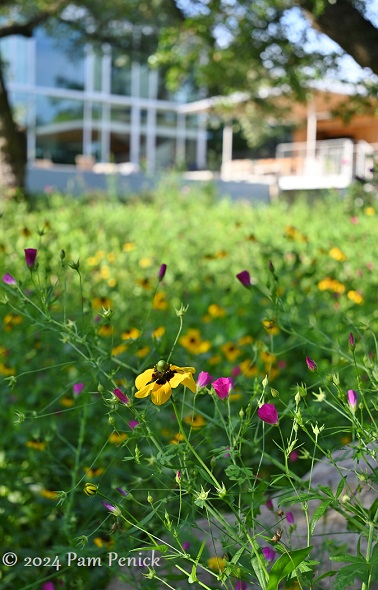
A native Texan originally from Dallas, Colin appreciates that his half-acre prairie, when fully established, will require much less water than a traditional, lawn-dominated landscape. When I asked him what happens with the prairie in summer, he was matter-of-fact: “It goes dormant, right? It turns brown. And that’s OK. It doesn’t bother me. I mean, it’s 109 degrees. What is it supposed to do? I go dormant also.”
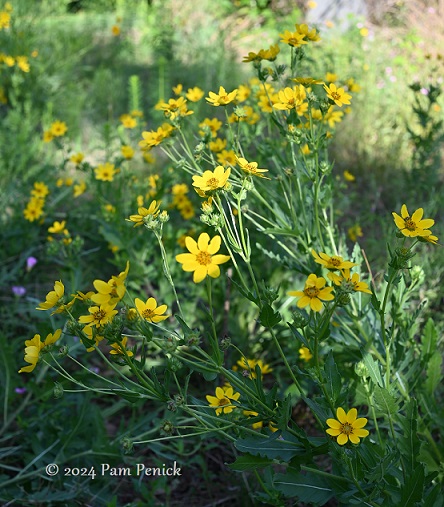
Of course, a prairie doesn’t go completely dormant in summer, even a blistering one. “You still have activity in summer,” Colin added. “It’s just that the colors aren’t there. But that’s also part of Texas. It’s a tradeoff.”
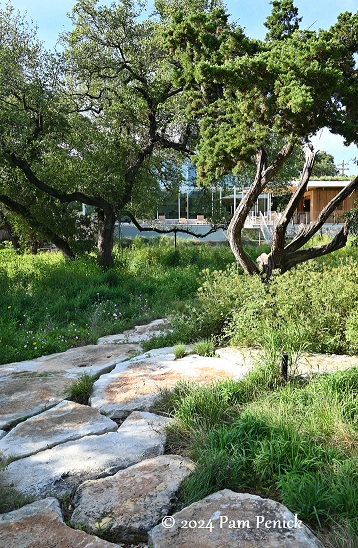
Chunky slabs of limestone cut a rugged path through the garden, curving under a shady belt of live oaks and junipers.
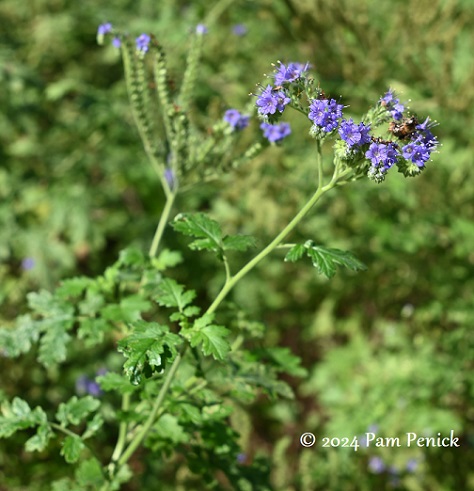
Blue curls, a charming annual or biennial wildflower, attracts bees.
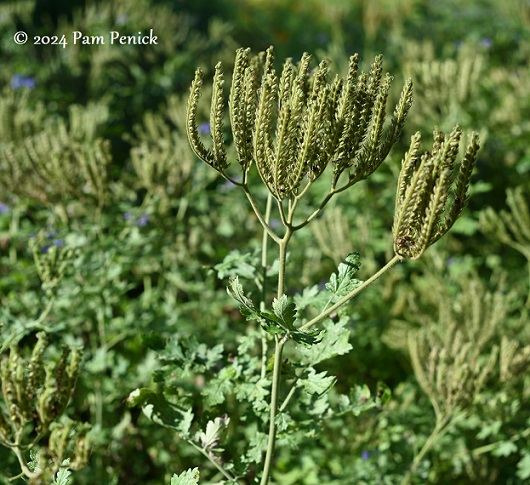
Blue curls seedheads
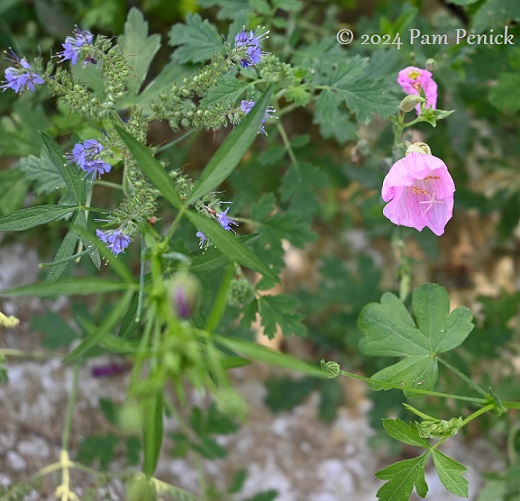
Colin doesn’t have traditional turfgrass, and he has zero regrets about opting out. “What I tell my friends, and I firmly believe this – people have an idealized image of what their yard is going to look like: close-clipped green grass year-round, and it’s going to be beautiful. I understand that’s what you want. But that’s not going to happen. It’s not the end result. So many friends with ‘normal’ yards — they don’t look the way they thought it would look, and they require a lot of upkeep.”
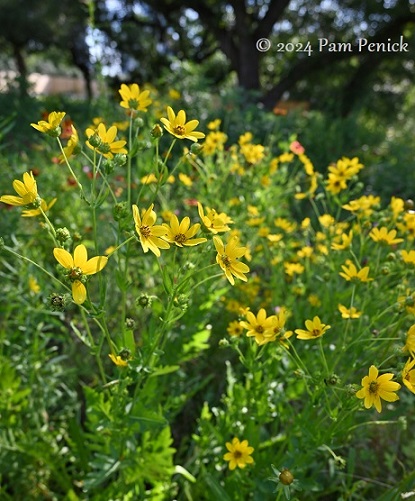
He sees the prairie garden as requiring less work overall. “I moved in in late October and didn’t do anything until March, or something like that,” he said. “It’s just wonderful. Generally speaking, I love the low maintenance with periods of high maintenance, as opposed to someone coming by every week to edge and mow.”
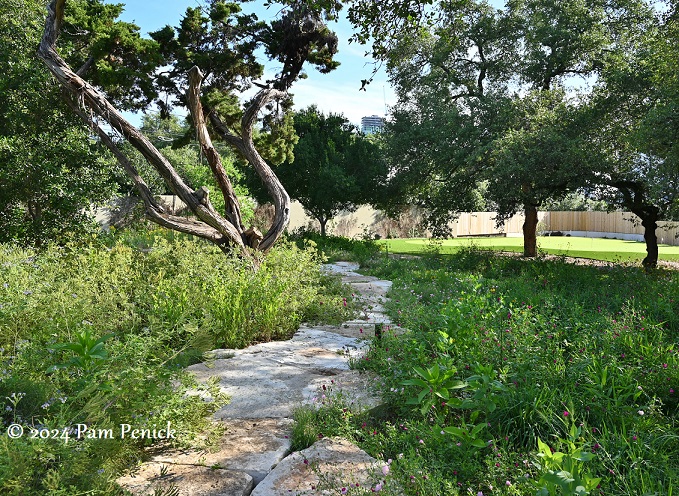
In a back corner, out of the main view of house and terrace, Colin installed a faux-turf golfing green for recreational enjoyment.
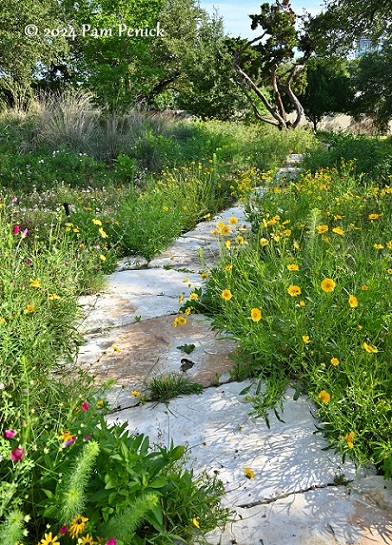
The limestone path takes you there, through prairie plants abuzz with bees, butterflies, and birds.
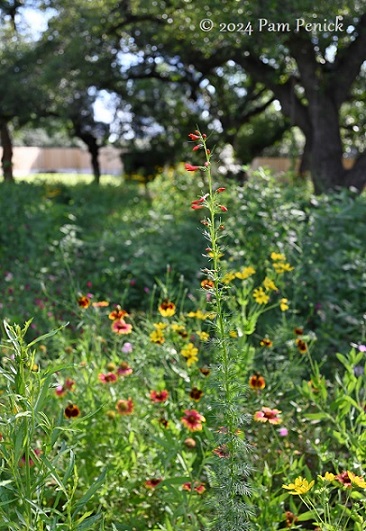
Standing cypress just coming into bloom
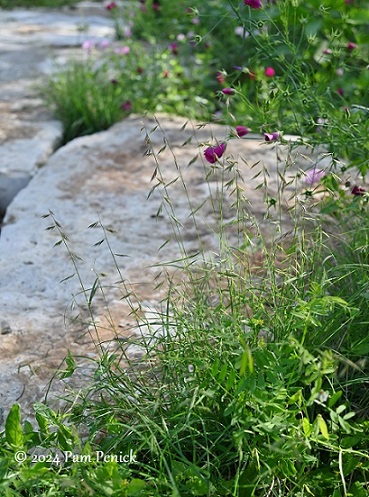
Texas grama and standing winecup
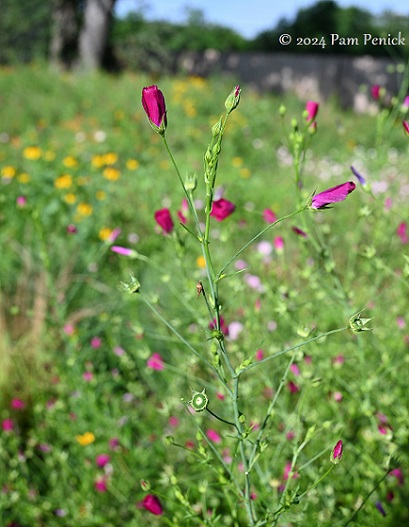
Standing winecup
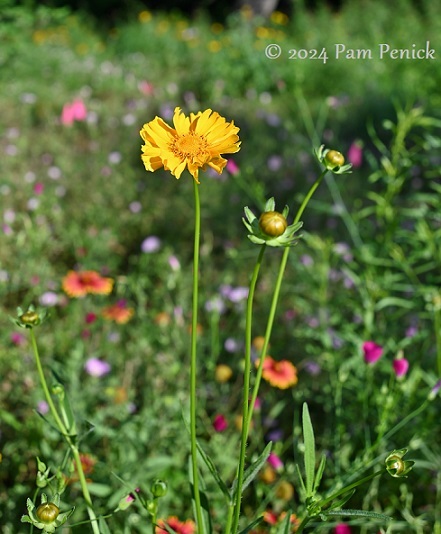
Coreopsis
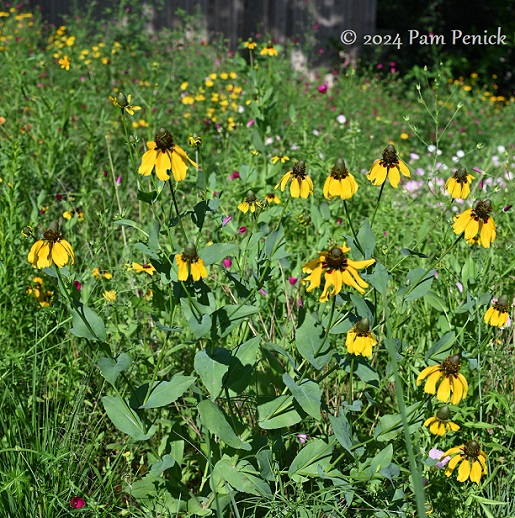
Giant coneflower
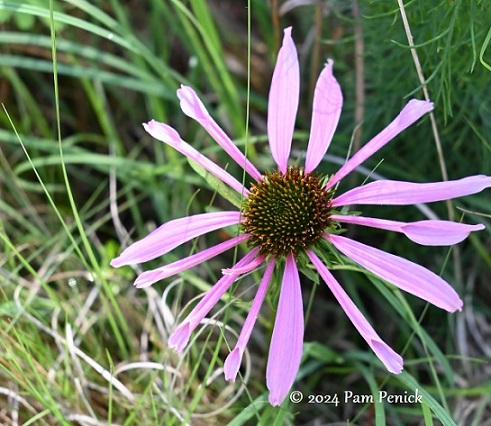
Pale purple coneflower (Echinacea pallida)
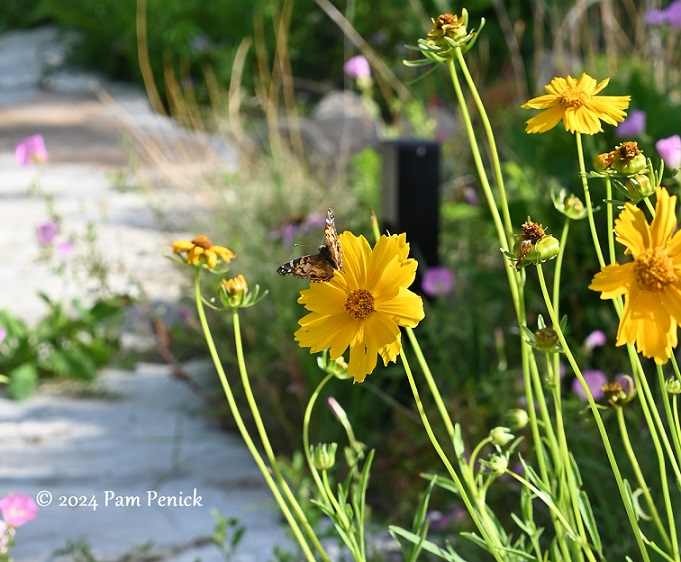
Coreopsis and painted lady butterfly
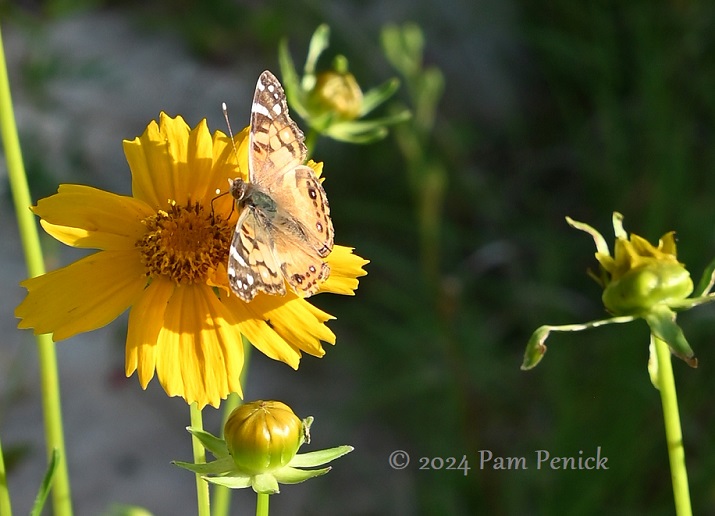
Sipping from a flower
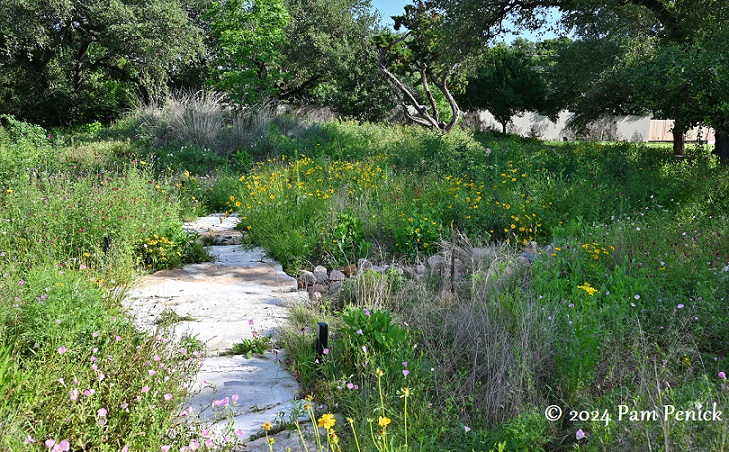
Yellows dominate now, after the blues and pinks of early spring
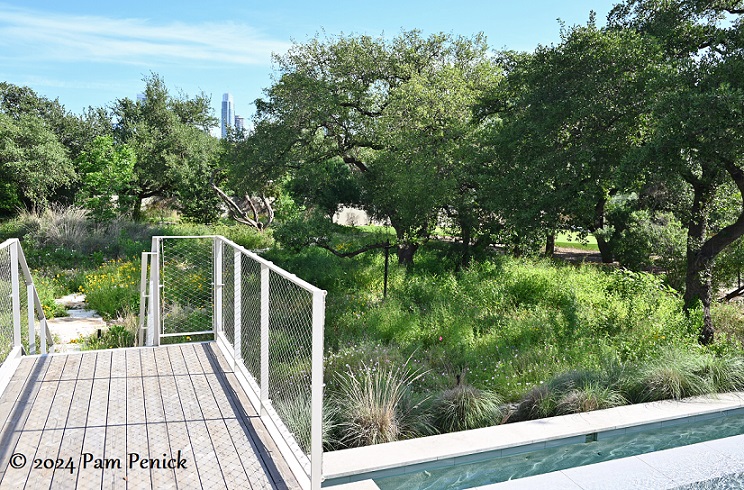
View from the swimming pool terrace, with a lap pool below. Downtown’s skyscrapers can be glimpsed through the trees.
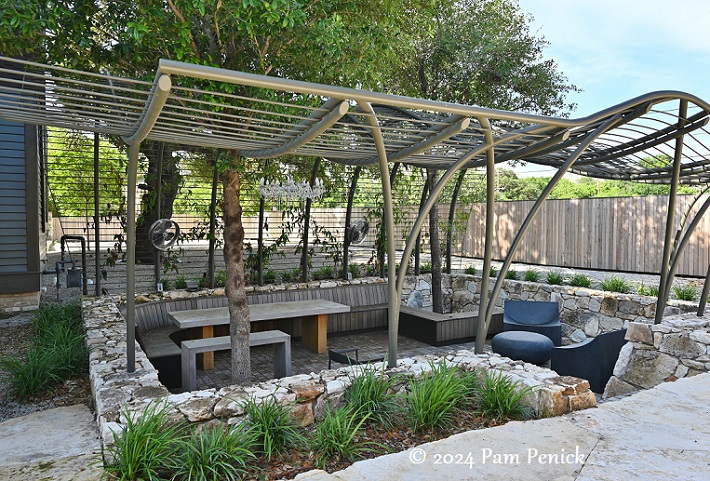
By the house, a sunken patio with a swooping, contemporary arbor makes a shady destination for relaxing outdoors.
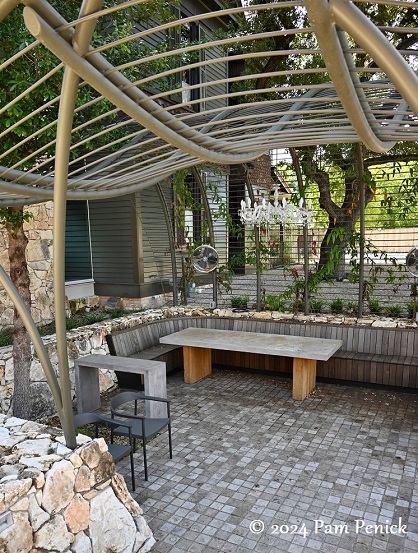
Shademaker Studio collaborated on the design with Ken Johnson at Michael Hsu Office Of Architecture, which designed the home’s contemporary addition.
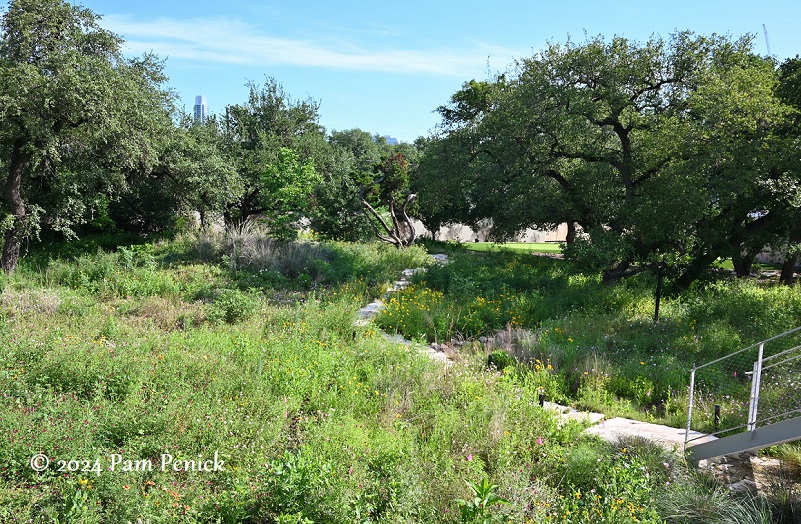
Wide view of the prairie
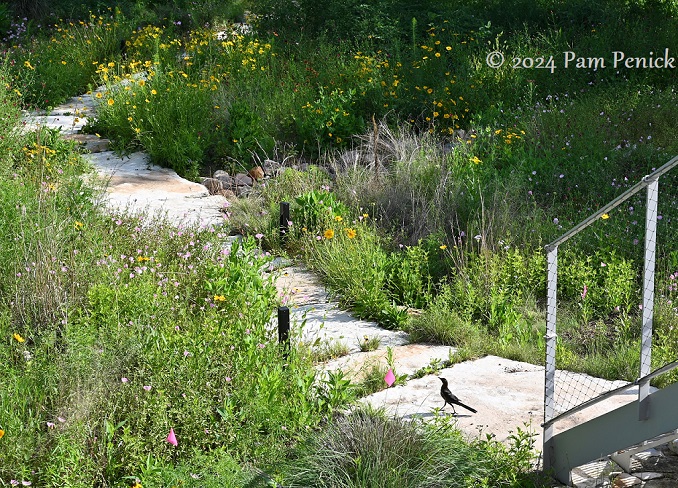
Grackle taking a stroll
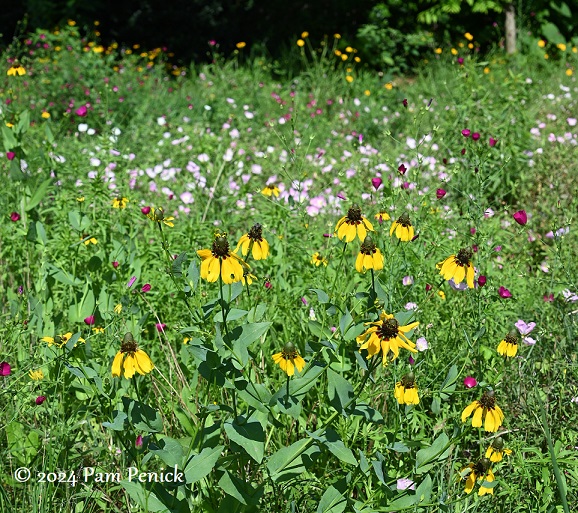
Giant coneflower with standing winecup and pink evening primrose
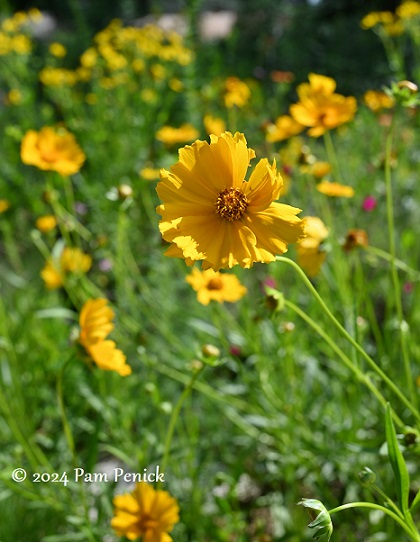
Coreopsis
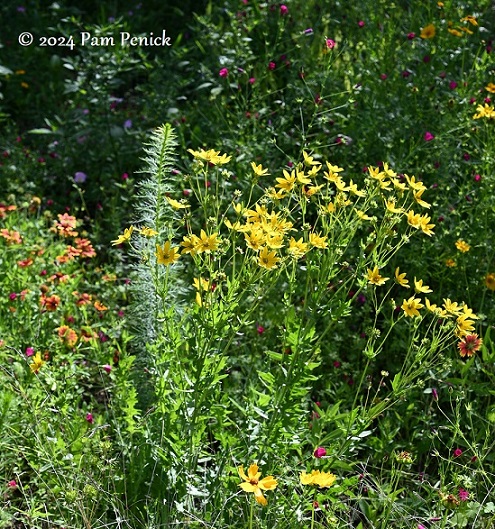
Engelmann’s daisy and standing cypress
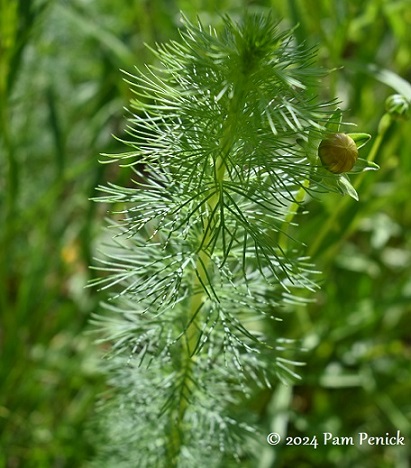
Feathery foliage of standing cypress
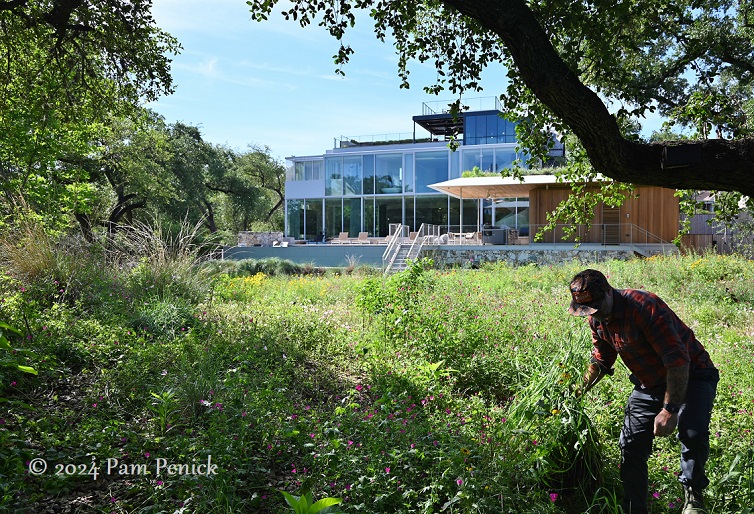
John Hart is like every gardener I’ve ever known — he can’t not pull a weed if he spots one.
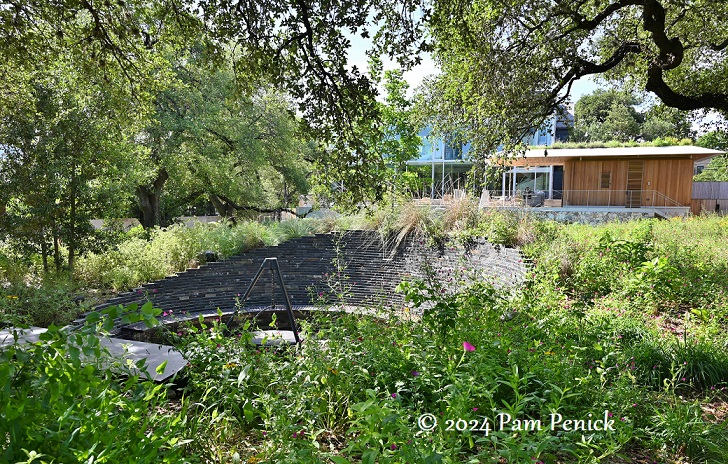
In the middle of the prairie, a large berm conceals a sunken patio edged with dark-gray stone — a fire bunker, Shaney calls it. Her firm, Shademaker Studio, built it.
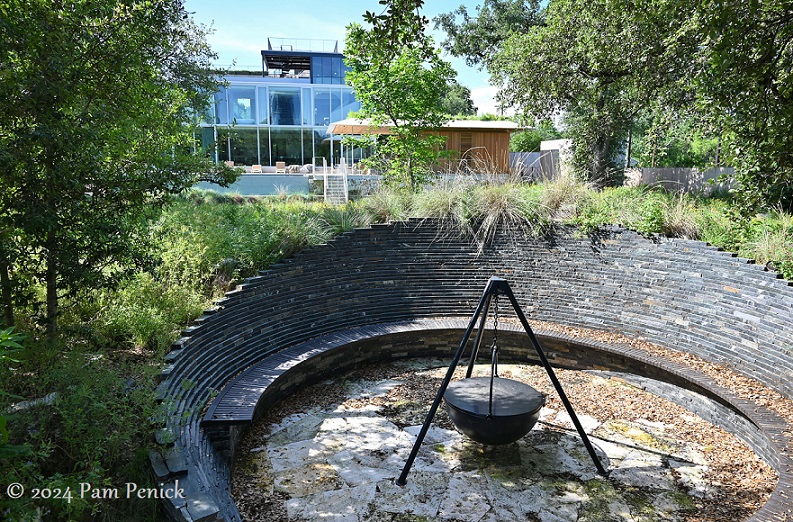
A Cowboy Cauldron stands in the center, encircled by a council-ring bench, ready to warm up cool nights with a fire. “I wanted a spot away from the house,” Colin told me. “I like the fact that if you’re sitting in it, you can’t really see the house. You feel like you’re kind of camping out. On the house side, the south side, we planted a bigtooth maple. It turns red in the fall — it’s really pretty — and then loses its leaves in the winter, so the sun will come in there to warm you. I thought that was a nice touch.”
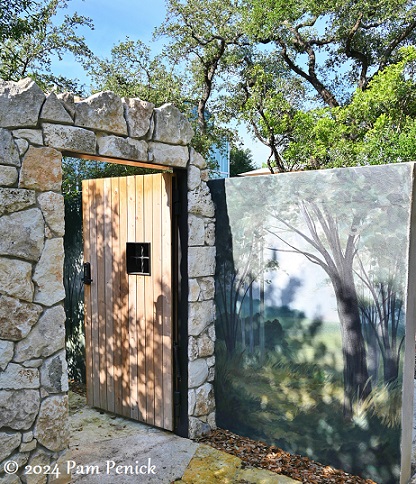
Another nice touch is a garden mural on a wall by a back gate.
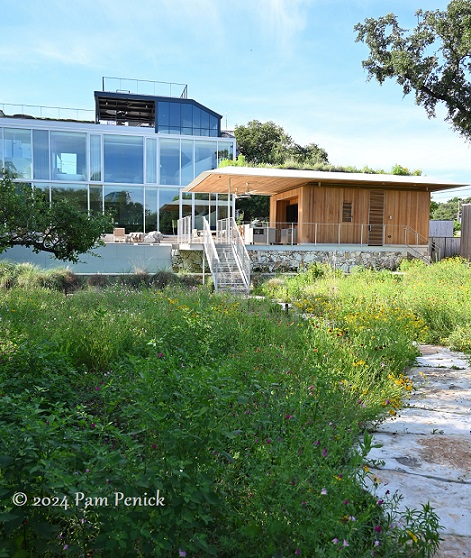
My thanks to Colin for sharing his beautiful garden with me, and to John Hart for the tour and sharing the wonders of the prairie. If you’d like to learn more about this prairie garden, watch John Hart’s video at Central Texas Gardener (Season 28, Episode 3).
I welcome your comments. Please scroll to the end of this post to leave one. If you’re reading in an email, click here to visit Digging and find the comment box at the end of each post. And hey, did someone forward this email to you, and you want to subscribe? Click here to get Digging delivered directly to your inbox!
__________________________
Digging Deeper
May 4: Explore “brilliant backyards, perfect pools and pergolas, and outdoor rooms and gardens” on the ATX Outdoor Living Tour on 5/4, 10 am to 3 pm. Landscape architects, designers, and builders will be on hand to answer questions. Tickets are $33.85 for adults, $17.85 for kids age 10-17.
May 11: Tour four Austin gardens on 5/11, from 9 am to 3 pm, on the Inside Austin Gardens Tour. Each garden “is created and cared for by a Travis County Master Gardener and demonstrates realistic gardening practices that inform and inspire.” Tickets are $25, or free for children 12 and under.
May 18: On Austin Home’s Great Outdoors Tour, held 5/18 from 10 am to 3 pm, find “Pinterest-worthy pools and outdoor kitchens to thoughtful plantings and stylish urban density solutions.” Tickets are $30.
May 18: Pop up to Dallas for the 2024 DCMGA Garden Tour on 5/18 from 10 am to 5 pm. Tickets are $18 if purchased online prior to 6 pm on 5/17, or $22 after 6 pm on 5/17 or at the event. For a sneak peek, click here.
June 1-2: Take a self-guided, 2-day tour of ponds and gardens in and around Austin on the annual Austin Pond and Garden Tour, held 6/1 and 6/2, 9 am to 5 pm. Tickets are $20 to $25.
Come learn about gardening and design at Garden Spark! I organize in-person talks by inspiring designers, landscape architects, authors, and gardeners a few times a year in Austin. These are limited-attendance events that sell out quickly, so join the Garden Spark email list to be notified in advance; simply click this link and ask to be added. Season 8 kicks off in fall 2024. Stay tuned for more info!
All material © 2024 by Pam Penick for Digging. Unauthorized reproduction prohibited.

